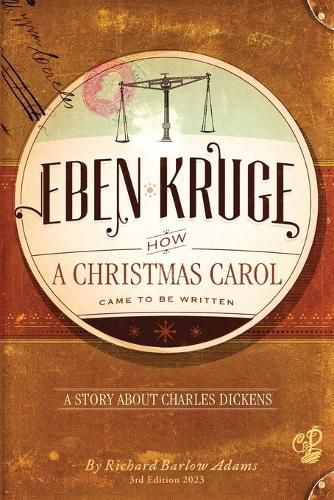Readings Newsletter
Become a Readings Member to make your shopping experience even easier.
Sign in or sign up for free!
You’re not far away from qualifying for FREE standard shipping within Australia
You’ve qualified for FREE standard shipping within Australia
The cart is loading…






This title is printed to order. This book may have been self-published. If so, we cannot guarantee the quality of the content. In the main most books will have gone through the editing process however some may not. We therefore suggest that you be aware of this before ordering this book. If in doubt check either the author or publisher’s details as we are unable to accept any returns unless they are faulty. Please contact us if you have any questions.
How wonderful it is for those who love Christmas to read and hear stories that inspire the happiest of seasons. And no story is as compelling as Charles Dickens's "A Christmas Carol," penned in 1843. But what inspired the "Carol"? What triggered Dickens' imagination to write a story so unlike anything he had written before-a story about Christmas, a story wrought with flashbacks and flash-forwards, and a story infused with the supernatural? In "Eben Kruge," Richard Barlow Adams delivers a page-turning narrative that weaves fact and fiction for a penetrating look inside the life and psyche of Dickens.
In 1842, Dickens and his wife Catherine travel to America at the invitation of Washington Irving, a trip funded by Dickens's publisher. Thirty years old and already world-famous, he visits nearly two dozen cities, as far south as Richmond, as far west as St. Louis, and as far north as Quebec. At the end of the five-month trip, exhausted, overly vetted, and less than enamored with the new nation, he makes a final stop at the United States Military Academy north of New York City. While at the Academy, the narrative unfolds. Dickens learns of the man Eben Kruge, an attorney who resides in Cornwall, a man whose "black turned to white" quite literally overnight. Declaring he must meet the man and know his story, Dickens strikes out for Cornwall early the next morning, oblivious to what lies ahead and risking the secret he intended to take to his grave.
$9.00 standard shipping within Australia
FREE standard shipping within Australia for orders over $100.00
Express & International shipping calculated at checkout
This title is printed to order. This book may have been self-published. If so, we cannot guarantee the quality of the content. In the main most books will have gone through the editing process however some may not. We therefore suggest that you be aware of this before ordering this book. If in doubt check either the author or publisher’s details as we are unable to accept any returns unless they are faulty. Please contact us if you have any questions.
How wonderful it is for those who love Christmas to read and hear stories that inspire the happiest of seasons. And no story is as compelling as Charles Dickens's "A Christmas Carol," penned in 1843. But what inspired the "Carol"? What triggered Dickens' imagination to write a story so unlike anything he had written before-a story about Christmas, a story wrought with flashbacks and flash-forwards, and a story infused with the supernatural? In "Eben Kruge," Richard Barlow Adams delivers a page-turning narrative that weaves fact and fiction for a penetrating look inside the life and psyche of Dickens.
In 1842, Dickens and his wife Catherine travel to America at the invitation of Washington Irving, a trip funded by Dickens's publisher. Thirty years old and already world-famous, he visits nearly two dozen cities, as far south as Richmond, as far west as St. Louis, and as far north as Quebec. At the end of the five-month trip, exhausted, overly vetted, and less than enamored with the new nation, he makes a final stop at the United States Military Academy north of New York City. While at the Academy, the narrative unfolds. Dickens learns of the man Eben Kruge, an attorney who resides in Cornwall, a man whose "black turned to white" quite literally overnight. Declaring he must meet the man and know his story, Dickens strikes out for Cornwall early the next morning, oblivious to what lies ahead and risking the secret he intended to take to his grave.